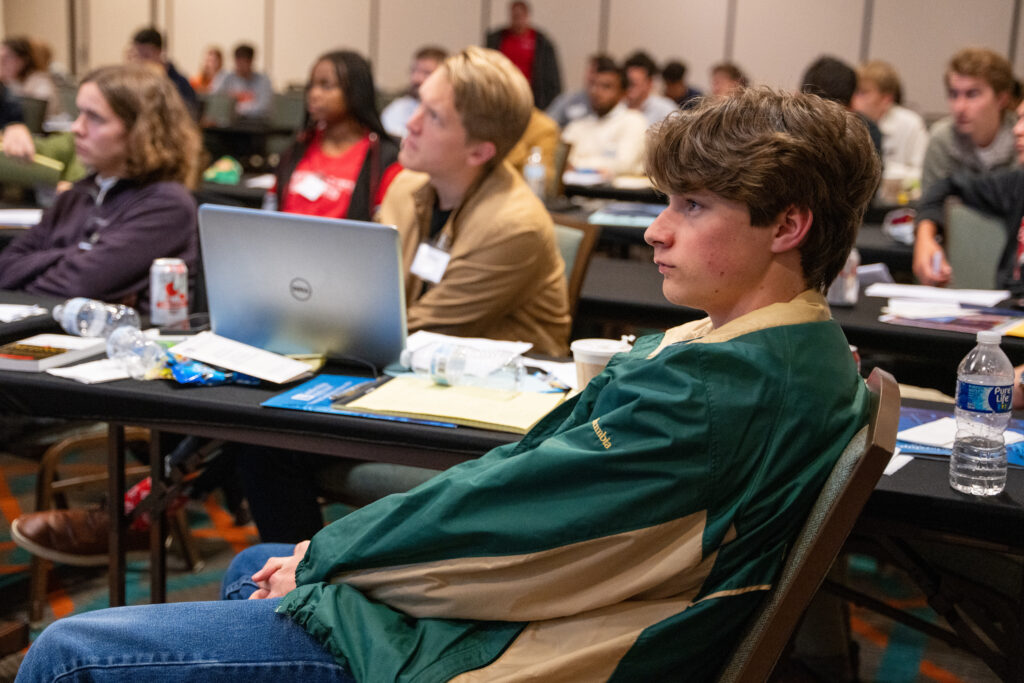- You’ll learn about key topics, including how to:
Set up a systematic, ongoing program to recruit large numbers of new members - Conduct programs which educate other students
- Deepen your own philosophical education
- Establish working ties with conservative and libertarian leaders and organizations at the local, state, and national levels
- Raise sufficient funds for your activities
- Earn favorable publicity for your groups and projects
- Identify and work with local conservative or libertarian faculty
- Prepare worthy successors to replace yourself next year
- Remain involved in your group as a mentor and ally after you graduate
What you do on campus will change people’s lives, including your own.
From my own career, I can promise you that, years from now, you will look back on this period of your life as one of your most interesting and valuable experiences.
LEADERSHIP
Leadership Qualities
A great campus group leader is:
- Philosophically solid
- Technique-oriented
- Courageous
- Persistent
- Prudent about making commitments
- Scrupulous about keeping commitments
- Skilled in verbal and written communication
- Good with numbers and in handling money
A group leader must also demonstrate sustained enthusiasm – and commitment – to the organization. You set the tone and the expectations for your club with your behavior.
If you’re an able leader, you’ll keep your group focused on the organization’s mission and ready to tackle new projects and new programs on your campus.
A group leader’s responsibilities include the ability to:
- Recruit new members for the organization
- Dedicate time to the group
- Motivate and direct the rest of the group
- Be level-headed and effective in a crisis
- Identify and train new leaders
By no means does every effective member have the skills to become a group leader.
Every successful group includes deeply committed people who can maximize their effectiveness by working with others. There’s nothing wrong with that. It’s a high calling.
Leadership Training
One of the best predictors of sustained group success is well-trained leaders.
You and your group members can learn about leadership through trial and error. But it’s much quicker, practical, and fun to get top-notch training in effective techniques and apply them to gain valuable personal experience.
Youth Leadership School
The Leadership Institute’s Youth Leadership School (YLS) – known as the “boot camp of politics” – will teach you how to increase the effectiveness of your group and be a competent youth leader for candidates and causes.
In this two-day, comprehensive training, you’ll learn how to:
- Increase the size and effectiveness of your group
- Motivate group members with exciting projects
- Host successful speaker events
- Gain media coverage
You and your group members will bring proven tools and techniques back to your campus – and you’ll build motivation and camaraderie, too.
Many campus groups send their membership. Some go further: the Young Americans for Liberty (YAL) chapter at the University of Louisiana at Lafayette requires all group members to attend the YLS in their group constitution.
The YLS is held across the country on weekends throughout the year.
You can find the most up-to-date calendar on the Leadership Institute’s website (leadershipinstitute.org/training) or by contacting the YLS staff (YLS@leadershipinstitute.org or 703-247-2000).
“The Leadership Institute’s Youth Leadership School has transformed the way my chapter of Young Americans for Liberty operates on campus. I believe that requiring all executive board members to take a Youth Leadership School directly contributed to our chapter becoming the 2018 YAL Chapter of the Year. The YLS brought us from a few friends to a community of over 100 dedicated pro-liberty activists.”
— Kaleb Moore, Young Americans for Liberty, University of Louisiana-Lafayette
Student Activism Conference
The Leadership Institute’s Student Activism Conference (SAC) brings together the best conservative and libertarian student activists in the country each year.
You could be among them.
Conference attendees receive advanced training in building a network of student leaders, and get hands-on experience in skills like conducting media interviews.
At the SAC, you’ll learn how to:
- Expand group membership
- Build coalitions on campus
- Raise funds
- Earn media attention
- Deliver a message on camera
- Host successful events and programs
- Develop a leadership succession plan
- Expose leftist bias and abuse
Contact your LI Regional Field Coordinator (visit leadershipinstitute.org/campus/map.cfm to find the coordinator serving your state) to learn about the next Student Activism Conference. If you’re chosen to attend, your travel, hotel, and meals will all be covered thanks to generous Leadership Institute donors.
Expand the Leadership
It does you and your group no good to centralize all the power around you as the group leader.
You must expand the leadership. Delegate responsibilities. Give group members a stake in the group’s future (essentially: “give ‘em a title and get ‘em involved”).
Encourage your members to develop their own skills as activists and leaders. The success and survival of your group depends on it.
The Young Americans for Freedom Chapter at the University of Florida has developed a broad leadership structure: 15 leadership spots – and they’re willing to create more as needed. New members quickly become involved and invested. Returning members keep their enthusiasm high as they can move up in the group’s ranks.
“With Leadership Institute training, I learned that it is important to ‘give ‘em a title and get ‘em involved.’ I began creating position for my YAF chapter and getting as many people involved as possible. If we see a need, we don’t hesitate to create a new position.”
— Daniel Weldon, Young Americans for Freedom at the University of Florida
Leadership Transition
The hallmark of your effectiveness as a leader is setting your group up for years of success.
Too often, student leaders graduate and their group falls apart. The leaders may congratulate themselves for being the glue that held the group together. All they’ve demonstrated, however, is their own failure in leadership. They let down their group – and themselves.
The final test of leadership comes in the year after you step down. Does your group continue to flourish, or does it dwindle or die off? You can control the outcome today.
Commit to constantly identifying and developing promising new leaders. Then make and enact a plan to transition power to them.
You might also consider beginning the tradition of electing a junior as your chapter president. The junior president should then promptly identify a talented sophomore to train as the next leader throughout the year.
The former chapter president, a senior, can then serve as a senior advisor to the group. In this role, the former president assists in the decision-making process and offers advice to the new president as requested.
The Students for Gun Rights group at Liberty University in Lynchburg, Virginia, has its senior president train and ensure they are ready to take the group over once he graduates. By using this system, this chapter has been sustainable for over six years and continues to grow and train new leaders on campus.
Faculty Advisors
If you can find one who is sympathetic to your cause, a faculty advisor can be a valuable resource for your campus group.
The majority of faculty are long-term university employees. They can help to maintain the longevity of your group as seniors graduate and freshmen arrive.
The Hawaii Pacific University Laissez-Faire Society has a faculty advisor who helps to identify and support new group leaders. The group has been around since 2006 – more than 10 years – because of the advisor’s work to keep the group active.
An advisor can help you:
- Properly host meetings and plan events
- Navigate your school’s bureaucracy to achieve your goals
- Find faculty who will offer extra credit to their classes to attend your public programs
- Become recognized as an official student organization, which will help you reserve campus space and receive funding
Conservative or libertarian faculty members and staff are your best bet. Look carefully through the faculty of the Economics and Business departments in particular. You can also ask your LI Regional Field Coordinator for assistance.
Sometimes you just can’t find a conservative or libertarian professor in any liberal arts field who is willing to serve as your club’s faculty advisor.
Search elsewhere. Often engineering professors or others in the “hard sciences” share your political philosophy and make great faculty advisors.
Try to find an advisor who wants to be involved in your group. It’s best if your advisor is willing to attend meetings, support activism events and public programs, and help to hold your group (and you!) accountable.
RECRUITMENT
You must set up a systematic, ongoing program to recruit large numbers of new members.
Whether you’re at a four-year or two-year school, you’ll see a constant churn of students each year. Freshmen and transfer students arrive on campus, seniors graduate, and others spend time off-campus for study abroad programs or internships.
The numbers can be staggering. At a school like the University of California-Los Angeles, which has about 31,000 undergraduate students enrolled, there is almost a completely new set of 31,000 students … every four years.
As a bonus, an effective recruitment program will also keep your existing members active and involved with your group’s growth.
Tabling
Tabling is the number-one way to find new members and keep your existing members involved in your group. Plan to do it at least once a week.
Remember: you don’t to have to lead an officially recognized campus group to begin tabling. Don’t be afraid to table on behalf of a group you’d like to form – but haven’t formed yet.
Unfortunately, most students don’t know how to table correctly. They sit behind the table, make limited eye contact and conversation with passersby, and finish their tabling shifts without finding any new members.
To combat this, instruct your members to stand in front of the table and ask clever, provocative questions of students passing by. For example, you might ask, “Do you support freedom of speech? Or ‘Are you pro-life?”
Opening with a personal question about political views is a stronger recruitment tactic than asking whether people have time to talk. (Hint: students you want to talk to will always say “no.”)
It’s recommended that you schedule shifts with at least one guy and one girl. Your group members should dress like normal college students. Don’t ever wear business clothing while tabling; this will just deter other students.
The goal of tabling is to invite potential members to get involved. Quickly steer your conversation to your group and its mission. Ask the person you’re speaking with to join and attend a meeting.
Once a student has agreed to sign up, ask for his or her phone number. Phone numbers are far more valuable than emails.
Before your group’s next event – even a regularly scheduled membership meeting – text the potential member and invite them to attend.
“Tabling is the way to keep growing constantly and find the future leaders of the organization. If we are not growing, we are dying.”
— Tahmineh Dehbozorgi, Young Americans for Liberty at the University of California-Los Angeles
Organization Fairs
Student organization or involvement fairs are often held at the beginning of the academic year or semester. Check your school’s calendar to find when yours are scheduled.
These fairs are a valuable opportunity to identify potential group members. After all, students go to organization fairs with the goal of finding clubs and activities to join. That means they’ll require far less convincing to sign up for your group or consider attending a meeting.
If you cannot access a table, distribute clipboards to your group members and sign up students that way. If you’re asked to leave by university officials, explain that you wanted to do the organization fair “right” (i.e. with a table) … but you also didn’t want to miss the opportunity to find members for your club.
“The student org fair is the most important recruitment opportunity because it’s the beginning of the semester when students are feeling lonely, overwhelmed, and they need to connect with like-minded people.”
— Brooke Paz, Students for Life of America at California State University, Fullerton
Social Media
Social media is not a replacement for tabling. But it can support your group’s efforts to attract and communicate with new members.
For example, you can use Facebook’s search to find students who have “liked” conservative and libertarian politicians, celebrities, groups, and causes. Look for currently enrolled students who have mutual friends with you.
Send a brief, relatable Facebook message (e.g. “I saw you liked Rand Paul and were friends with John Doe–do you still attend State Tech?”) and ask them to join your group. Your goal is to follow up with a phone call so you can establish a relationship – and stay in touch for future events. Quickly fold in new members to your existing group; add them to your Facebook group or group chat.
Create social media accounts dedicated to your group, based on what platforms are most popular at your school and what you can reasonably manage. Foster a social media environment that is both work and play to help maintain members’ involvement and communication.
Make sure the transition of social media account information is part of your leadership transition each year. You don’t want to discover a student studying abroad or a graduate now working out of state is the only person who can reset your Instagram password.
You can also join social media groups for coalitions, whether specific to your campus or at a state or national level. If you’re in a chapter for a national organization, it’s highly likely the organization has groups for you to join.
Follow-Up
No matter how you identify a potential group member – tabling, an organization fair, social media, or a personal conversation – you must follow up with each person.










